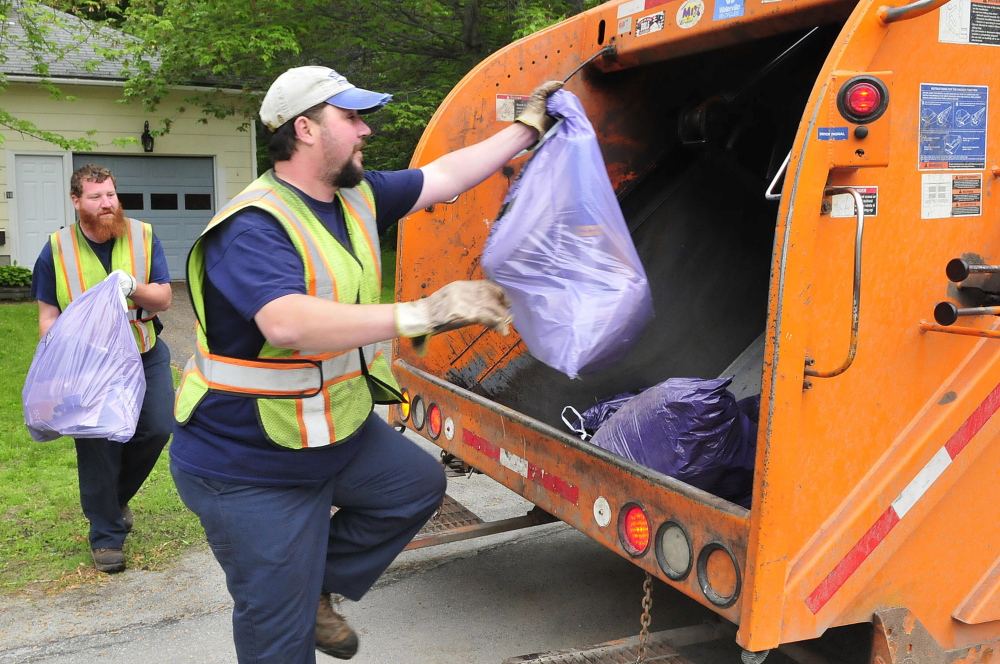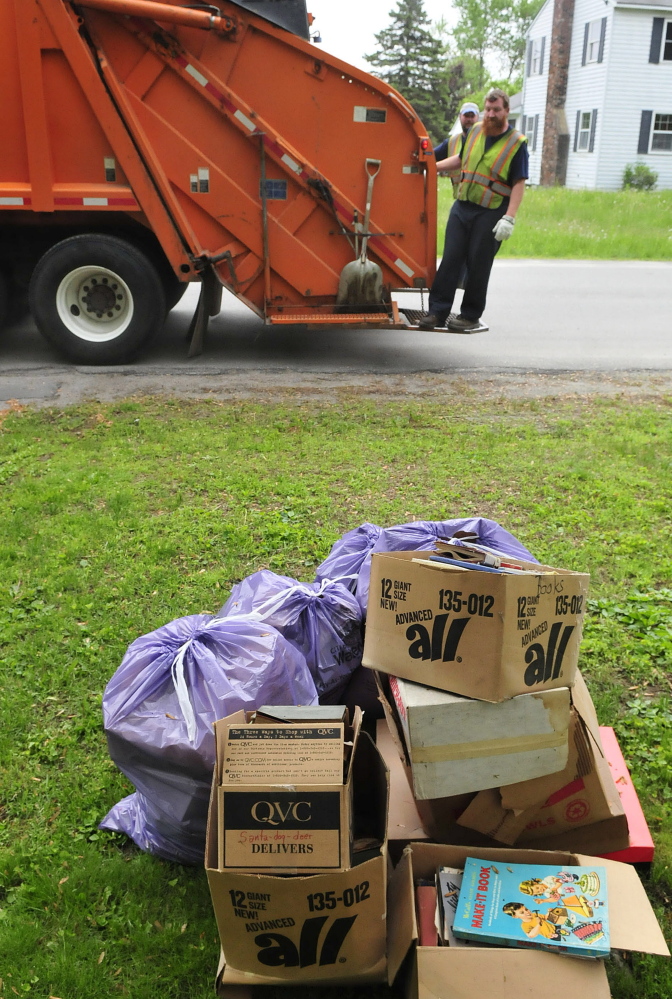WATERVILLE — Heather Merrow was initially leery about having to buy special purple bags from the city to dispose of her trash.
That was nearly a year ago, when city officials were talking about launching pay-as-you-throw, a new city trash collection system that would be combined with curbside pickup recycling that doesn’t need to be sorted.
The idea was that if city residents had to pay directly for what they threw away, they would be more conscious about what they tossed — and the city would reduce the amount of trash it took to the transfer station.
Merrow, who lives with her husband and son in the city’s South End, wasn’t sure she liked the idea. But now, eight months into the program, Merrow sees the situation differently. She said her family uses one, 15-gallon bag each week for trash and pays $1.25 for that bag, and the revenue from that purchase pays for the curbside recycling program.
“With single-sort recycling, it’s as easy as can be — it doesn’t get any easier,” said Merrow, 49. “To me, it’s reasonable. It makes you think about your trash now.”
That’s why Merrow plans to vote “No” at a special citywide referendum Tuesday asking whether the pay-as-you-throw and single-stream recycling program should be repealed effective Sept. 1 this year.
A “Yes” vote would repeal the City Council resolution that authorized the trash collection and recycling programs.
Barbara Shea, of Johnson Heights, plans to vote yes to abolish the program. City officials didn’t characterize pay-as-you-throw as an extra tax before approving it last year, she said, but she said it is.
The 30-gallon trash bags are sold in rolls of five and cost $10 a roll. The 15-gallon bags are sold in rolls of eight, with each roll costing $10.
“I already pay taxes, and to me this is an added tax,” Shea said of having to buy the city trash bags. She added: “That’s what makes a lot of us mad — they didn’t give the citizens of Waterville enough of a voice, and they did railroad this through, lickety-split. How many times has that happened in this city? Not too many.”
The polls Tuesday will be open 8 a.m. to 8 p.m. at the American Legion Post at 21 College Ave.
The City Council last year voted 5-2 to approve a $37.2 million municipal and school budget for 2014-15 that included pay-as-you-throw and single-stream recycling with the stipulation that residents in June 2015 would be able to vote on whether to keep or toss those programs. Council Chairman Fred Stubbert, D-Ward 1, and Karen Rancourt-Thomas, D-Ward 7, voted against the budget, saying residents should have been allowed to vote on the trash issue.
Shea says city officials should have allowed residents to vote on the program last year. She said she has spoken to many people who find creative ways to dispose of their trash, such as taking it to their workplaces and dumping it, and that is why the city has reduced its tonnage.
Shea maintains the city should take a step back and discuss alternatives to pay-as-you-throw.
“This is a scare tactic,” she said. “This whole thing reminds me of when one kid chewed gum and starts to blow bubbles and then nobody can chew gun. I’ve been recycling for years, and I don’t know how many people in the city recycle, but because of those who have not, we all have to go this route. Recycling is not hard. It’s easy.”
TRASH FACTS
Public Works Director Mark Turner says the new trash and recycling programs have exceeded the city’s expectations in helping to reduce the waste stream — which was the goal of instituting them in the first place.
“The average in the industry is 40-45 percent reduction,” Turner said. “We’re at about 55 percent right now — about 10 percent higher than average.”
He acknowledges that the percentage may be so high because Waterville is in its first year of the program and people are rallying to make it work. Turner said residents are recycling a lot, and that is working well also.
“Both programs working together have been a very well-received program,” he said.
The city had been looking at alternative trash disposal programs because in 2018 its contract with Penobscot Energy Recovery Co. in Orrington will expire and the current $60 per ton fee to dispose of waste there is expected to double, according to City Manager Michael Roy.
In the first eight months of pay-as-you-throw, the city has received $215,000 in revenues from the sale of the purple bags, according to the city’s finance director, Chuck Calkins. Turner said revenues from bags for the entire first year is estimated to be about $300,000.
Meanwhile, Turner said that the city has saved about $135,000 in processing, disposal and tipping fees since pay-as-you-throw started and workers have picked up less trash at the curb.
“We were averaging 18 tons a day, and now our average is 8.87,” Turner said. “We dropped by about 10 tons per day.”
In the full first year of the program, the program is expected to save the city about $430,000, according to both Roy and Calkins. If voters repeal pay-as-you-throw and recycling, city officials say they would have to find that amount — $430,000 — in cuts to a proposed $39 million municipal and school budget for 2015-16.
Councilors are slated to take the first of three votes on the budget at 7 p.m. Tuesday, about an hour before the polls close on the special trash referendum. Councilors were originally to have taken that first vote on the budget Tuesday, June 2, but three councilors were absent from the meeting so the council didn’t have a quorum.
HOW IT WORKS
WasteZero supplies the city’s purple trash bags to retailers, including Hannaford and Shaw’s supermarkets, Wal-Mart, hardware and other stores. The retailers receive no profit from the sale of the bags.
WasteZero keeps track of how many bags are sold and pays the city $1.68 for each $2 bag sold and keeps 32 cents. For each $1.25, 15-gallon bag sold, WasteZero pays the city $1.03 and keeps the rest. The city pays 5.5 percent sales tax on the bags.
The city’s Public Works Department picks up residents’ trash in the purple bags left at the curb once a week on days scheduled for particular neighborhoods. Sullivan’s Disposal of Thorndike picks up recyclables at the curb the first and third full week of the month on residents’ regular trash pickup days and takes them to ecomaine in Portland to be sorted and sold.
City officials recently negotiated with Sullivan’s at the request of residents to pick up recyclables every other week starting in July, as residents complained that there are some months that have an additional week and recyclables pile up.
The city pays Sullivan’s $72,000 a year to pick up recyclables. If there are times Sullivan’s can not pick up recyclables on the longer months, the city will do it, according to Turner. The city hauls its trash to the Oakland Transfer Station, where it is combined with Oakland’s trash and Oakland hauls it to PERC.
Turner said public works employees spend about three hours less a day on trash pickup because people are throwing out less trash. Those workers now spend the extra three hours doing other tasks including working at the yard waste site at the public works complex, working at Pine Grove Cemetery, which the city now operates, performing roadside cleanup and cleaning up graffiti in the city.
“Another benefit of the trash crew having a shorter collection day is that, during the winter, we can get them out clearing sidewalks a lot sooner than we had been able to do in previous years,” Turner said. “This enabled us to respond, in most cases, immediately following measurable snow accumulations rather than a day or two later. There was noticeable improvement in our remedial response time in removing snow from sidewalks in key pedestrian access areas around schools, churches and in the downtown.”
NOT MANDATORY
Residents do not have to take part in pay-as-you-throw and many do not — they hire private haulers to pick up their trash instead.
Gregory’s Disposal of Fairfield, for instance, has picked up 300 residential customers in Waterville since pay-as-you-throw started last September, according to company owner Gregory Rabe.
Rabe said people are still calling to ask if he can take them as customers.
“We’ve had a good response to our service,” he said.
Customers pay an average of $23 a month for weekly pickup, depending on the size of a household, according to Rabe.
In addition to picking up trash, Gregory workers will pick up items at the curb such as an old vacuum cleaner, barbecue grill or kitchen chair at no extra cost. They also will pick up larger items such as couches and appliances for a fee, Rabe said.
Rabe said he has talked to people who like the city’s recycling program and a lot of people who like pay-as-you-throw. But those who want to hire him to pick up their trash are vocal about opposing the city’s trash collection program.
“Obviously, the ones that call me are not going to be happy campers,” he said.
Turner says there are about 5,500 residential units in the city, including two- and four-unit apartment buildings, as well as mobile homes, and the city picks up their trash. Any apartment complex with more than four units must have private trash pickup, according to Turner. Waterville’s population is about 16,000.
Before pay-as-you-throw launched, residents at public meetings voiced worry that such a program would prompt illegal dumping.
But Turner said that while people dump illegally at places such as the end of Airport Road, off County Road, under Carter Memorial Bridge, at the ball field off Water Street and in Pine Grove and St. Francis cemeteries on Grove Street, the city actually is seeing less illegal dumping this year than last year.
“I think places are being monitored a lot closer,” he said. “We’re more involved in the (Pine Grove) cemetery. We’re there every day. We’re watching it. That was a horrible dumping area.”
Amy Calder — 861-9247
Twitter: @AmyCalder17
Send questions/comments to the editors.







Comments are no longer available on this story